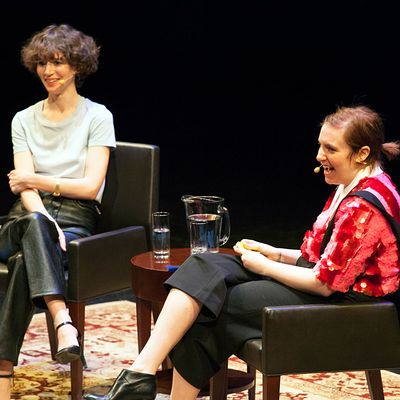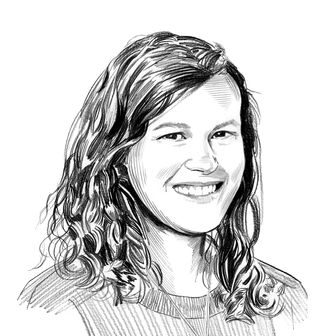
Last night at BAM, Lena Dunham sat down with the filmmaker and writer Miranda July to interview her about her debut novel, The First Bad Man. Their conversation was meandering, candid, at times sad, and funny — and it touched on everything from poorly anticipating things that other people find offensive to radical sexual fantasies to the frustration of being called “quirky.” Here are five frank, poignant moments from their conversation.
ON WHY IT’S SO ANNOYING TO LABEL FEMALE ARTISTS AS “QUIRKY”:
Lena Dunham: One of my biggest rages is when people use the word quirky around you and your work. It fills me with a hot lava of anger that’s impossible to describe. Something that’s interesting about this book and the violence and sexuality and the sort of barren hideousness of some of the characters in it felt almost like a revolt. There’s no way anyone could apply that word to anything surrounding this book. Even the cover is just, like, stark and black. And I wondered if that was about growing as an artist, if you felt like there was any conscious retaliation, or if you’re just so made of magic that you’re not internalizing any of it, or whether you don’t want to be friends anymore.
Miranda July: It’s funny because people are having no problem calling this book quirky, or annoying, the cousin of quirky … so that party just keeps on rolling on. Although I will say that I think that, just culturally, things have shifted a little bit. Like that’s a little bit of an old hack, lazy journalist thing to do, especially with a woman. So I think it’s not quite as drastic. But to be honest, I didn’t feel like this was a retaliation; I felt like I was just trying to write a good book and that all my work had darkness in it and humor, but certain things had been easy to latch on to. A lot of those things about my personhood, the very thing I was most uneasy about putting in my movies … But I think retaliation only gets you so far, and then you’re out in the desert alone and no one cares.
ON INTENSE, CONFLICTED FEELINGS ABOUT MOTHERHOOD:
Dunham: To me, this book in many ways is about unusual women wanting the usual things, and having an unorthodox relationship to motherhood, and one of the reasons it was so moving to me was that a lot of it was about a complex woman — maybe I’m just projecting massively — but a complex and creative woman who’s living a different version of life than she was told she could live, but who ultimately still does want love, does want partnership, does want to be a mother. I wondered twofold whether that idea resonated with you, and whether for you it was a book about the journey to understanding motherhood, and also how mothers have talked to you about motherhood.
July: Well, it’s funny; I think I enjoyed the fact that I knew I was going to be ultimately a mother writing this book, like I started writing when I was pregnant, and I knew that I hadn’t been yearning to be a mother in the way that I saw a lot of people around me doing that. But, nonetheless, I had planned on having a child since I was a child, and I had a lot of mystical thoughts about babies, and I felt like, I think I can write about motherhood and wanting to be a mother without it ever even being clear until the last minute that that’s what we’re even talking about here. And that excited me, because I’m kind of turned off by a lot of motherhood stuff. Like, I kept meaning to join the mom’s group in the neighborhood, and then I just never did.
I was saying to my husband, “Guess what: Turns out I have a lot of fans who are moms, and they’re really happy I had a baby and that I’m, like, in the club now.” It’s been quite satisfying, actually. There’s sort of like all these stages of aging semi-publicly that I hadn’t anticipated — like the great celebration of joining the group of people that was kind of waiting — I mean, not like for me specifically, but for anyone. So, literally, I’ve been getting lots of notes and stuff saying, I’m so glad you’re a mother now. I am, too. And it is something that you can look into another mom’s eyes while you’re signing her book and be like, Yeah, yeah, we’re both about to cry right now because we love our kids so much. There’s nothing fake about it. So that’s kind of nice.
ON THE IMPLICATIONS OF SEXUAL FANTASIES:
Dunham: There’s a moment in the book where Cheryl switches into having this hypermale sexuality that was actually quite — using the parlance of our times — “triggering” for me. I found it super-intense and challenging to read, and I wondered what that was like for you to write and how you accessed that part of her mind.
July: Yeah, so what she’s talking about is if you’re a straight woman and you’re having a sexual fantasy where there’s a straight couple having sex, but you’re being the man fucking the woman.
Dunham: You’re the man fucking the woman, and you’re fucking the woman the way that men who are in porn or men who are in frats would. You’re not fucking the woman as a nice cardigan’d gentleman.
July: So you’re taking everything that has been sold to you and kind of accidentally being the wrong person in it. That, I guess, is how I feel about it. I feel like we all watch the same stuff. It all goes into our eyeballs. We’re all sold this kind of sex, and I don’t think that our psyches necessarily discern that much between the genders. I think in general the woman is the sexy one — the one you want to get. So if you’re just looking at it in that way, sex is fucking a woman. There isn’t any other sex.
Dunham: And the person you’re watching experience all the pleasure, who gets to have the thing, is the guy.
July: Yeah, so that’s the role you want to be in.
Dunham: When I said that I found it triggering, what I really meant is that it had never occurred to me that was a way that it was possible to think. Suddenly the sexual world took on a new and uncomfortable dimension.
July: Right … Yeah, I want to hear this. I wouldn’t have written this if I didn’t want to have these conversations.
ON THE DIFFICULTY OF ANTICIPATING WHAT WILL OFFEND PEOPLE:
Dunham: I can never guess accurately what is going to offend or confuse anybody, and I thought maybe [I] could give you the chance now to guess, and defend yourself.
July: This is like your fantasy question.
Dunham: I know, and I thought I’d give it to you.
July: Well, let me think back in time. Let’s see.
Dunham: You could also save it for later in the conversation.
July: Or just later in my life.
Dunham: But part of it is that you get to do it now.
July: Well, it’s funny, you always know there’s going to be something. I worried about the adoption community. I mean, I did do some research: I talked to a woman who’d adopted a child. But actually, I just looked at the email she sent back after I kind of laid out what I wanted to do. She was like, “Hmmm, I’ve never really heard of there being a home birth with adoption.” You know, there were just some details that just weren’t completely holding water for her. And I’m just like, “Oh well, I think it’s going to be okay.” So there’s that.
Dunham: So you’re concerned that the adoption community would take issue with your depiction of, like, the logistics of adoption.
July: Yeah. But there are some nice real details that hopefully they will also pick up on.
ON WHAT IT’S LIKE TO BE CALLED LAZY:
Dunham: My last question is, do you feel smarter having written a novel?
July: Um, yeah, I kind of do. I’m not reading press anymore; I kind of got the gist of it, but I did see a headline today that said, like, “Is She Kidding or Just Lazy?” or something like that. And that did such a good job at pushing my button. It was like calling an anorexic person fat. Like, I have real issues around that. I feel deeply lazy, so I actually felt seen.





